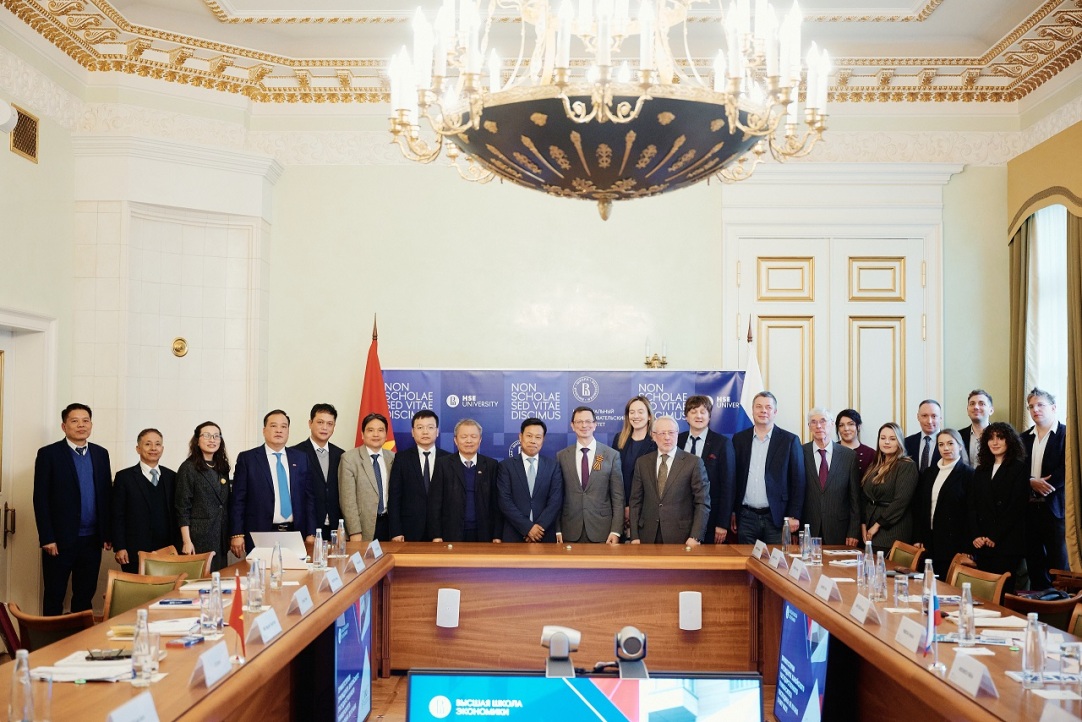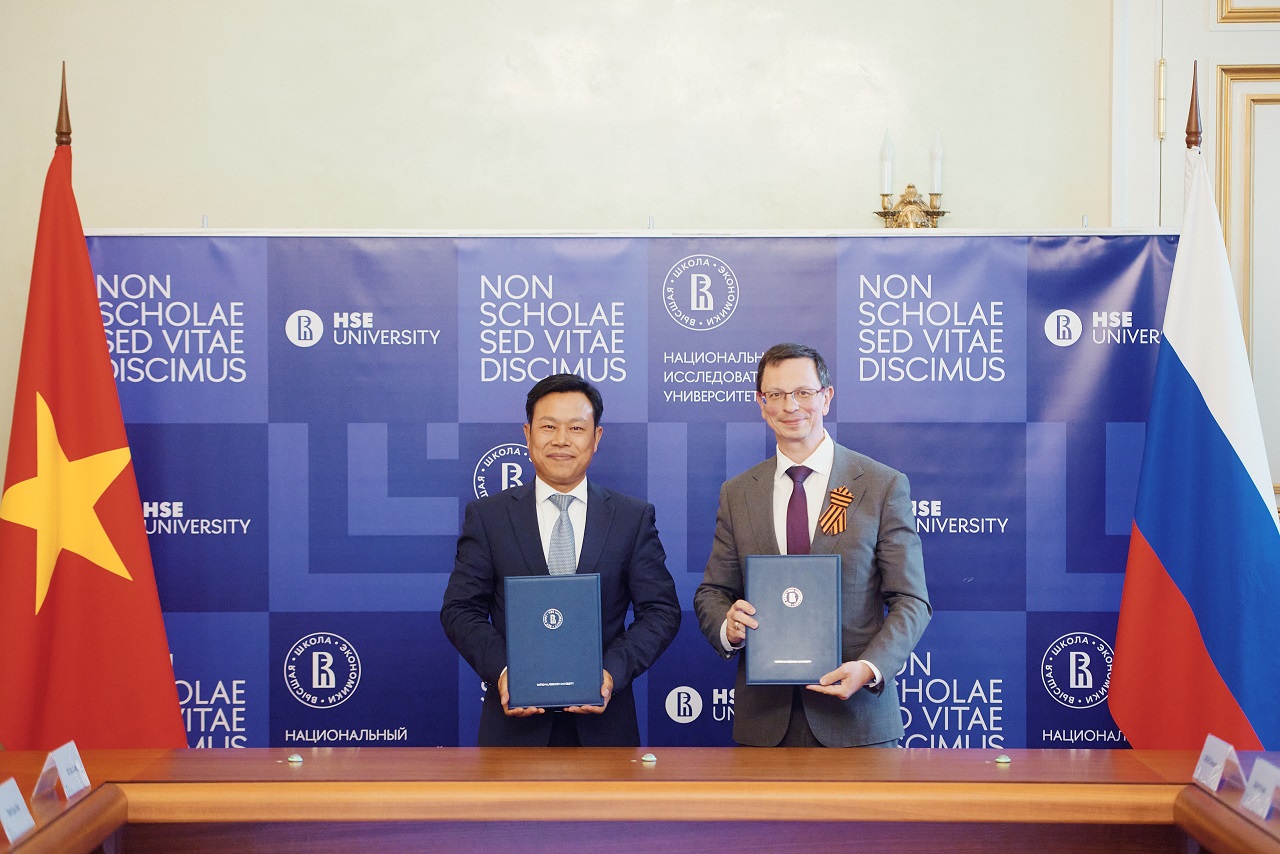HSE and Vietnam National University to Establish Joint Research Institute

A cooperation agreement has been signed in Moscow between HSE University and Vietnam National University, Hanoi (VNU). The document was signed during the official visit of a Vietnamese delegation to celebrations marking the 80th anniversary of Victory Day and negotiations involving President of the Russian Federation Vladimir Putin and General Secretary of the Central Committee of the Communist Party of Vietnam Tô Lâm. The agreement was signed by HSE Rector Nikita Anisimov and VNU Rector Le Quan.
The joint research institute will focus on cutting-edge developments, the coordination of bilateral research programmes, academic exchanges, and the enhancement of scientific capacity.
On May 12, a meeting took place at HSE University between the delegation from Vietnam National University, led by Rector Le Quan, and HSE Rector Nikita Anisimov, along with other university representatives. The parties discussed key aspects of launching joint projects and the concrete steps required for their implementation.

During the Vietnamese delegation’s visit, HSE University also signed an agreement with the Vietnam Academy of Science and Technology (VAST). HSE University and VAST agreed to strengthen scientific and cultural cooperation, joint projects, conferences, and the exchange of scientific knowledge.
These initiatives mark a new phase in the scientific and educational partnership between Russia and Vietnam. The expansion of cooperation and the establishment of a shared research space not only strengthen bilateral ties but also enhance both countries’ contributions to the global scientific community, including the development of an intellectual foundation for the sustainable advancement of BRICS.
HSE University has been developing partnerships with Vietnamese educational and research institutions since 2016. It has cooperation agreements in place, including memoranda of understanding, as well as educational, research and academic mobility agreements, with various Vietnamese partners. These include the University of Engineering and Technology at Vietnam National University, the University of Economics in Ho Chi Minh City (UEH), the National Economics University, and others. Between 2020 and 2023, HSE University, in cooperation with the Vietnam Academy of Social Sciences and with the support of the Russian Foundation for Basic Research (RFBR), conducted the research project ‘Cross-Border Interaction, Socio-Cultural Transformations, and Local Communities in the Sino–Vietnamese Border Region in Government Projects of the PRC and Vietnam.’
See also:
HSE AI Research Centre Simplifies Particle Physics Experiments
Scientists at the HSE AI Research Centre have developed a novel approach to determining robustness in deep learning models. Their method works eight times faster than an exhaustive model search and significantly reduces the need for manual verification. It can be applied to particle physics problems using neural networks of various architectures. The study has been published in IEEE Access.
Scientists Show That Peer Influence Can Be as Effective as Expert Advice
Eating habits can be shaped not only by the authority of medical experts but also through ordinary conversations among friends. Researchers at HSE University have shown that advice from peers to reduce sugar consumption is just as effective as advice from experts. The study's findings have been published in Frontiers in Nutrition.
HSE University to Host Second ‘Genetics and the Heart’ Congress
HSE University, the National Research League of Cardiac Genetics, and the Central State Medical Academy of the Administrative Directorate of the President will hold the Second ‘Genetics and the Heart’ Congress with international participation. The event will take place on February 7–8, 2026, at the HSE University Cultural Centre.
HSE University Develops Tool for Assessing Text Complexity in Low-Resource Languages
Researchers at the HSE Centre for Language and Brain have developed a tool for assessing text complexity in low-resource languages. The first version supports several of Russia’s minority languages, including Adyghe, Bashkir, Buryat, Tatar, Ossetian, and Udmurt. This is the first tool of its kind designed specifically for these languages, taking into account their unique morphological and lexical features.
HSE Scientists Uncover How Authoritativeness Shapes Trust
Researchers at the HSE Institute for Cognitive Neuroscience have studied how the brain responds to audio deepfakes—realistic fake speech recordings created using AI. The study shows that people tend to trust the current opinion of an authoritative speaker even when new statements contradict the speaker’s previous position. This effect also occurs when the statement conflicts with the listener’s internal attitudes. The research has been published in the journal NeuroImage.
Language Mapping in the Operating Room: HSE Neurolinguists Assist Surgeons in Complex Brain Surgery
Researchers from the HSE Center for Language and Brain took part in brain surgery on a patient who had been seriously wounded in the SMO. A shell fragment approximately five centimetres long entered through the eye socket, penetrated the cranial cavity, and became lodged in the brain, piercing the temporal lobe responsible for language. Surgeons at the Burdenko Main Military Clinical Hospital removed the foreign object while the patient remained conscious. During the operation, neurolinguists conducted language tests to ensure that language function was preserved.
HSE MIEM and AlphaCHIP Innovation Centre Sign Cooperation Agreement
The key objectives of the partnership include joint projects in microelectronics and the involvement of company specialists in supervising the research activities of undergraduate and postgraduate students. Plans also focus on the preparation of joint academic publications, the organisation of industrial placements and student internships, and professional development programmes for the company’s specialists.
HSE University and InfoWatch Group Sign Cooperation Agreement
HSE University and the InfoWatch Group of Companies marked the start of a new stage in their collaboration with the signing of a new agreement. The partnership aims to develop educational programmes and strengthen the practical training of specialists for the digital economy. The parties will cooperate in developing and reviewing curricula, and experts from InfoWatch will be involved in teaching and mentoring IT and information security specialists at HSE University.
Scientists Discover One of the Longest-Lasting Cases of COVID-19
An international team, including researchers from HSE University, examined an unusual SARS-CoV-2 sample obtained from an HIV-positive patient. Genetic analysis revealed multiple mutations and showed that the virus had been evolving inside the patient’s body for two years. This finding supports the theory that the virus can persist in individuals for years, gradually accumulate mutations, and eventually spill back into the population. The study's findings have been published in Frontiers in Cellular and Infection Microbiology.
HSE Scientists Use MEG for Precise Language Mapping in the Brain
Scientists at the HSE Centre for Language and Brain have demonstrated a more accurate way to identify the boundaries of language regions in the brain. They used magnetoencephalography (MEG) together with a sentence-completion task, which activates language areas and reveals their functioning in real time. This approach can help clinicians plan surgeries more effectively and improve diagnostic accuracy in cases where fMRI is not the optimal method. The study has been published in the European Journal of Neuroscience.


